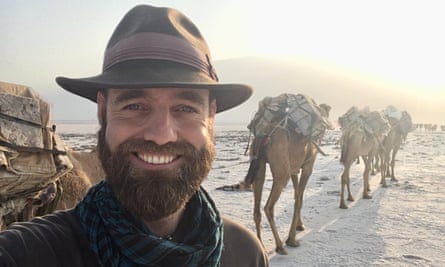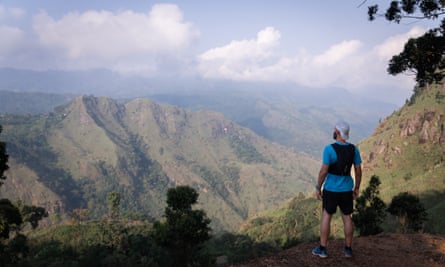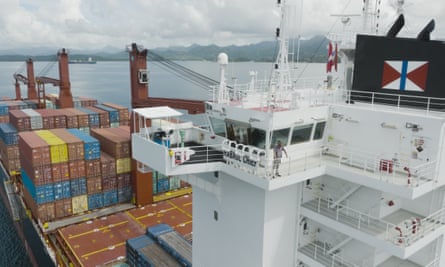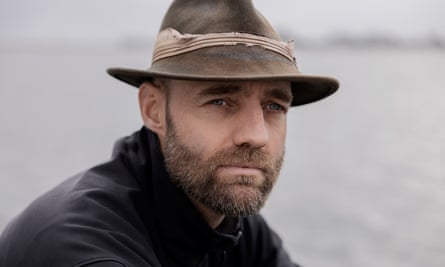Torbjørn Pedersen has always dreamed of being a famous adventurer. He spent his childhood building dens in the woods, pretending to be his hero, Indiana Jones. Even as an adult, he couldn’t shake the sense that he was destined for greatness.
There was just one problem. “I was born at least 100 years too late,” he tells me over video call from his home in Copenhagen. “I had a profound feeling that everything had been done. The great adventures took place in the past. It was all over.”
Things reached a tipping point in 2013. He was 34 and had a successful career in shipping and logistics. He had just bought a flat and started a serious relationship. It was time to give up his childish dreams. Then his dad sent him an article about people who had travelled to every country in the world. “I didn’t know you could do that,” he says. “Certainly you would have to be a millionaire.”
But here were ordinary people walking, cycling and hitchhiking around the globe on shoestring budgets. Then came his eureka moment: “I discovered that no one had ever gone to every country in the world completely without flying [in one unbroken trip].” (A British man, Graham Hughes, has set foot in every country without flying, but took two breaks from the journey for personal reasons.)

Pedersen was already obsessed with world firsts: “The first to go to the north pole, the south pole, the deepest sea, the highest mountain, the longest river.” Now he had a chance to set a world record himself. “It was right in front of me,” he says, eyes gleaming. “It could be Ibn Battuta, Marco Polo … Thor Pedersen! I could do something of significance with my life, something worth putting in a book, something worth remembering. And it would be a great adventure!”
Pedersen spent the next 10 months planning the journey – the route, budget, what to pack – without ever making a conscious decision to go. It was only when he turned down an opportunity to work in South America that he realised he was fully invested in the project, as he had started to call it. He set himself three rules: at least 24 hours in each country; no visits home; and absolutely no flying. His list of countries included the 195 states recognised by the UN, plus extras such as Kosovo and Taiwan – 203 in total. He figured the journey would take him about four years. His budget was $20 a day, funded by savings, supporter donations and sponsorship. He would be acting as a goodwill ambassador for the Danish Red Cross, raising awareness of its work in 199 countries and encouraging people to give blood. He also aimed to share something positive about every single country – “even the ones we hear horrible things about” – on social media.
What made him think he had even a hope of completing such an epic task? “I was born to do this.” Pedersen had lived in three countries by the age of seven – Denmark, Canada and the US – and spent holidays in a fourth, Finland (his father is Danish, his mother Finnish). “I was uprooted a lot as a child,” he says.
After school and business school, he completed military service and became a UN peacekeeper, stationed in Ethiopia, Eritrea and Djibouti. But he says it was his first overseas logistics job after leaving the army that really shaped him. He went to Libya, then still under Muammar Gaddafi’s rule. “I can barely recognise the person who was sent to Libya and the one who came back,” he says. “I was green, lacking in self-confidence. I came back after two years with proper life experience.”

He started to work all over the world: in Bangladesh, Greenland, the Arctic Circle, Kazakhstan and Azerbaijan, as well as Florida and a number of European countries. He also trained in humanitarian aid and volunteered at a homeless shelter.
His parents, who had divorced when he was 15, each reacted differently to his project. His dad was convinced he was throwing away a glittering career. Pedersen had to explain to him that this wasn’t an extended gap year; he would not be “sitting on a beach with long hair, playing a guitar and smoking something I shouldn’t”. His mum, who had taken a young Thor mushroom hunting and told him tales about trolls, accepted the idea. “I also like to travel,” was all she said.
It was a lot harder breaking the news to his girlfriend, Le. They had been together less than a year, and now he was going into self-imposed exile. “I have had previous experience with long-distance relationships and it’s hard. I was trying to warn her against it while wanting her to stay,” he says. They agreed to give things a go.
Pedersen left Denmark on 10 October 2013, heading first to Europe and then North America. “These continents were very easy in terms of logistics and bureaucracy,” he says. The difficulty in Europe was sticking to the budget. He got a rail pass that allowed him unlimited travel for a month, and travelled as quickly as possible within the 24-hours-per-country rule. “I lost about 10 kilos in the first month. I was skipping meals, I didn’t get a lot of sleep. I was so exhausted.” He realised that moving on so quickly was impossible and he settled on a minimum of three days in a country.

As he ticked off countries, moving into Central and South America and to the Caribbean, his “no flying home” rule began to bite. “My grandmother died and I couldn’t come back for her funeral,” he says. A close family friend also died. “He was on his bicycle and his heart stopped. That was someone I wasn’t expecting to lose.” Then there were friends who were struggling. “I have had people really close to me who experienced depression, and I wasn’t there. I had to weigh out: do they have enough support without me? Can I support them from a distance? Or should I be there with them?”
His relationship with Le wasn’t plain sailing either. “We had some rough patches and came pretty close to breaking up,” he says. “But we found a way to fix it. We paid more attention and she came to visit me more frequently. Things got a lot better.” So much so that on her 10th visit Pedersen proposed, on top of Mount Kenya, in a snowstorm. “I was so nervous and scared – what if she said no? But she said yes.”
That was one of the happiest moments of the entire journey. He also has a fond memory of being on top of a truck in the Republic of the Congo. “I was on this truck for two days, with 40 or 50 people. It was slow, super-dusty, really hot and unbelievably uncomfortable,” he says. “As the sun was setting, the woman next to me started banging her water bottle rhythmically. Then she started singing. Another woman joined her, and then a man, and suddenly the whole truck was singing. It was beautiful, powerful, emotional – one of those moments where you realise: you could not buy a ticket for this.”
It was also incredibly satisfying when he crossed a border that had felt impossible. “I genuinely felt pleasure every time I entered a new country. That high was the best feeling in the world.”
But if the highs were dizzying, the lows were devastating. “I was living a nightmare at times. There were hundreds of difficult checkpoints; I had to recover from cerebral malaria; I was held up at gunpoint many times,” he says. “I should have been dead. I should’ve quit even more times.”
There is one incident which haunts him, when he was stopped by drunk, armed, hostile men in military uniform in the jungle near the Cameroon/Republic of the Congo border at 3am. He recently relived the experience when filming a documentary. “Suddenly, I was back in that situation; my heart started racing and I had tears in my eyes. I feel it coming back again now,” he says. “I have trauma in my body that is buried so deep, I know I’m going to have issues with it at a later point. I need to find a way to deal with it.”
Did he come close to giving up? “Oh yeah. I realised that I had imprisoned myself. I was in physical pain, emotional pain, I had no motivation and it felt like the world couldn’t care less about what I was doing.” How did he find the strength to carry on? “I didn’t want to be a person who quits.”
Pedersen had been travelling for more than six years when he and Le set a date to marry in New Zealand. He was on his way to their wedding, via four days’ transit in Hong Kong, in March 2020. You can guess the rest: Covid hit, the territory locked down and he didn’t leave Hong Kong for two years. She was back home in Denmark, but after they married online she managed to get a spousal visa and visit for 100 days, after restrictions had eased. The couple later had a ceremony on a beach in Vanuatu in the South Pacific.
Le visited him 27 times, but they still spent nine-tenths of their time apart. He puts the survival of their relationship down to trust and honesty. “I trust her and that gives me peace. And she knows she can trust me. If that trust isn’t there, it will poison the relationship,” he says.

He kept fit on the road by doing 30 push-ups and a one minute plank every day, and running when he could. Where did he most enjoy the food? “I had laksa for the first time when I got to the Malay area and it blew my mind. I had some really good food in Peru as well. In central Africa, you would get grilled fish on the roadside with some manioc (cassava), onion and a secret sauce … It was fantastic.”
And the worst? “Take your pick. I had snake, dog, horse, camel, a variety of different insects, cow’s skin, which was really gelatinous. The worst could be goat’s brain in Nigeria; I didn’t care much for that. Nigeria had amazing food too, though, such as suya – they cut meat into small strips, barbecue it, pour chilli on, add small pieces of onion, and serve it like fish and chips on newspaper with a toothpick.”
It’s unusual for someone completing a flight-free challenge to talk so little about the environment. Was he conscious of travelling sustainably? “The environment wasn’t a motivation, but I am very proud to look back at a project like this and say my carbon footprint was at a minimum,” he says. “In 2013, the climate debate wasn’t at all what it is today. I think people should definitely limit flying when they can.” Pedersen is open about his willingness to fly in the future – and, of course, he benefited from family and friends flying to visit him.
But overland travel has become more difficult, he says, thanks to increased border security, stricter rules on container ships and disappearing ferries. He gives Iran as an example. “They were perplexed that I wanted to enter overland when they have international airports where you can get a visa on arrival. It took me a good three weeks to get one.”

Travel has changed in other ways, too. “Twenty years ago, when I travelled in south-east Asia, you would wave down a tuk-tuk auto rickshaw and negotiate a price. These days, you use an app. The world is super-super-connected.”
As the end of his journey approached, he struggled. It had taken far longer than planned – nearly 10 years – and, he says, he experienced “burnout and had seen what is on the other side. I felt nothing when I reached the last two countries. Nothing at all. The smiles that I posted online were fake.” He chose a slow, 33-day voyage home from the Maldives to prepare himself. “The last three days, coming towards the port of Aarhus, I have never had more doubt in my life: ‘What if no one cares?’”
He walked down the gangway on 23 May 2023 to find his wife, father, two sisters, assorted journalists and 150 well-wishers. “People had come from abroad to be there because they wanted to witness history. There was so much love and support.” He says his reception was “ace”, but perhaps after a decade away, it could never be enough. “It could have been tens of thousands of people, you know, but it was 150 people and it was nice and positive and good.” He pauses. “And then my doubts came back. But I’m starting to figure things out now.”
What big lessons did he learn on his travels? “We are far more similar than anyone would ever believe. But we are so quick to see the differences.” Most people, he thinks, are good. “Chances are if you need help, and it is not too costly to them, people will help you. There are very few people who actively want to harm you. I can definitely say that I had help and support from someone in every country in the world.”
Still, he was more optimistic about the future of humanity before the pandemic. “And then I saw rich people buying up all the vaccines. There are still a lot of countries that are just getting their Covid vaccines now. That breaks my heart.” Power and money can corrupt anyone, he believes.
If anything, his quest to become a heroic explorer has taught him to rely on others. “The solution is not necessarily in you. A lot of solutions in life are found through other people. If you feel you have reached the end of the line, you just haven’t met the right person yet,” he says. “You might have to try 1,000 closed doors, but there is always an open door somewhere. Never, ever give up.”

